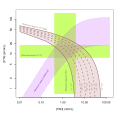Jostel's TSH index
Jostel's TSH index (also known as TSHI or Jostel's index) is a thyroid function test used to assess the thyroid gland's function. It is named after Dr. G. Jostel, who first proposed the index in 2009. The index is calculated by dividing the thyroid-stimulating hormone (TSH) level by the upper limit of the normal range, then multiplying by 100.
Overview[edit]
The TSH index is used to evaluate the severity of thyroid disease, particularly in cases of thyrotoxicosis (an excess of thyroid hormone) and hypothyroidism (a deficiency of thyroid hormone). It can also be used to monitor the effectiveness of treatment for these conditions.
Calculation[edit]
The TSH index is calculated using the following formula:
TSHI = (TSH / upper limit of normal) x 100
The upper limit of normal for TSH is typically around 4.0 mIU/L, but this can vary depending on the laboratory and the individual's age and health status.
Clinical use[edit]
The TSH index can be used to differentiate between different types of thyrotoxicosis, such as Graves' disease and toxic multinodular goitre. It can also help to determine the severity of hypothyroidism and monitor the response to treatment.
Limitations[edit]
While the TSH index is a useful tool in the diagnosis and management of thyroid disease, it is not without limitations. It is dependent on the accuracy of the TSH assay, and it may not be reliable in cases of pituitary disease or other conditions that affect TSH secretion.
See also[edit]
Ad. Transform your life with W8MD's Budget GLP-1 injections from $75


W8MD offers a medical weight loss program to lose weight in Philadelphia. Our physician-supervised medical weight loss provides:
- Weight loss injections in NYC (generic and brand names):
- Zepbound / Mounjaro, Wegovy / Ozempic, Saxenda
- Most insurances accepted or discounted self-pay rates. We will obtain insurance prior authorizations if needed.
- Generic GLP1 weight loss injections from $75 for the starting dose.
- Also offer prescription weight loss medications including Phentermine, Qsymia, Diethylpropion, Contrave etc.
NYC weight loss doctor appointmentsNYC weight loss doctor appointments
Start your NYC weight loss journey today at our NYC medical weight loss and Philadelphia medical weight loss clinics.
- Call 718-946-5500 to lose weight in NYC or for medical weight loss in Philadelphia 215-676-2334.
- Tags:NYC medical weight loss, Philadelphia lose weight Zepbound NYC, Budget GLP1 weight loss injections, Wegovy Philadelphia, Wegovy NYC, Philadelphia medical weight loss, Brookly weight loss and Wegovy NYC
|
WikiMD's Wellness Encyclopedia |
| Let Food Be Thy Medicine Medicine Thy Food - Hippocrates |
Medical Disclaimer: WikiMD is not a substitute for professional medical advice. The information on WikiMD is provided as an information resource only, may be incorrect, outdated or misleading, and is not to be used or relied on for any diagnostic or treatment purposes. Please consult your health care provider before making any healthcare decisions or for guidance about a specific medical condition. WikiMD expressly disclaims responsibility, and shall have no liability, for any damages, loss, injury, or liability whatsoever suffered as a result of your reliance on the information contained in this site. By visiting this site you agree to the foregoing terms and conditions, which may from time to time be changed or supplemented by WikiMD. If you do not agree to the foregoing terms and conditions, you should not enter or use this site. See full disclaimer.
Credits:Most images are courtesy of Wikimedia commons, and templates, categories Wikipedia, licensed under CC BY SA or similar.
Translate this page: - East Asian
中文,
日本,
한국어,
South Asian
हिन्दी,
தமிழ்,
తెలుగు,
Urdu,
ಕನ್ನಡ,
Southeast Asian
Indonesian,
Vietnamese,
Thai,
မြန်မာဘာသာ,
বাংলা
European
español,
Deutsch,
français,
Greek,
português do Brasil,
polski,
română,
русский,
Nederlands,
norsk,
svenska,
suomi,
Italian
Middle Eastern & African
عربى,
Turkish,
Persian,
Hebrew,
Afrikaans,
isiZulu,
Kiswahili,
Other
Bulgarian,
Hungarian,
Czech,
Swedish,
മലയാളം,
मराठी,
ਪੰਜਾਬੀ,
ગુજરાતી,
Portuguese,
Ukrainian




